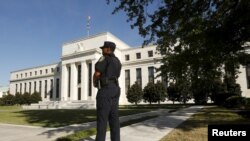The U.S. central bank may have missed the opportunity to raise record low interest rates last month. And some economists say it’s beginning to look less likely this year.
The October issue of the Levy Forecast by economist David Levy warns “the global economy is in the process of entering a recession.” It’s a frightening prospect that Levy says depends largely on slowing growth in emerging market economies, particularly China.
Levy says if a rate hike does occur this year, “a rate cut will soon follow”.
U.S. Federal Reserve chair Janet Yellen expressed less incendiary concerns last month when she announced no change in record low interest rates, which have hovered near zero since December 2008.
At a press conference immediately after the September meeting, Yellen said it remained unclear what impact recent market turmoil caused by uncertainty over China’s economy might have on the world’s largest economy.
“In light of the developments that we have seen and the impacts on financial markets, we want to take a little more time to evaluate the likely impacts on the United States” said Yellen.
October Central Bank meeting
The Federal Open Market Committee (FOMC) will meet again at the end this month (October 27-28) to discuss a possible rate hike.
The Fed has not ruled out a modest increase this year, but in a keynote speech at the annual meeting of the National Association of Business Economics (NABE), Federal Reserve Board governor Lael Brainard warned that raising rates too soon might hurt the US recovery.
“The downside risks make a strong case for continuing to carefully nurture the U.S. recovery and argue against prematurely taking away the support that has been critical to its vitality,” said Brainard.
The Fed’s monetary policy support since the end of the recession in 2008 has led to an increase in liquidity and a sharp reduction to near zero in the federal funds rate, the interest the Fed charges banks on overnight loans.
Low interest rates reduce the cost of borrowing, giving businesses an incentive to invest and expand their operations. It also helps consumers by giving them the ability to purchase goods at lower cost.
For and against
With the U.S. economy growing at a healthy pace in 2015, and unemployment hitting a seven-year low of 5.1 percent, some analysts believe it’s time for the Fed to raise interest rates.
One of the key economic arguments is that by making cash cheaper, low interest rates could fuel high inflation. But research director Joseph Minarik at the Committee for Economic Development says that has not been the case. Minarik says raising rates too soon might even discourage demand for major purchases, leading to a cascading cycle of slower growth, wage cuts and layoffs.
Some Fed officials including Loretta Mester at the Federal Reserve Bank of Cleveland say its time to increase the federal funds rate so the central bank can step away from the emergency measure of zero interest rates.
And others like economist Joe Brusuelas at financial consulting firm McGladrey, tell VOA that the Fed needs to raise its benchmark rate incrementally to about two percent “so when the inevitable recession comes, they can have firepower.”
But the Fed's Brainard says the underlying momentum in the U.S. economy may not be strong enough to resist the deflationary pull from emerging markets and urges caution when Fed officials meet.
Some, like NABE president Lisa Emsbo-Mattingly, worry the Fed may have inadvertently added to the ambiguity in the marketplace by adding external factors such as slow growth in emerging market economies to the Fed’s domestic goals of full employment and stable prices.




